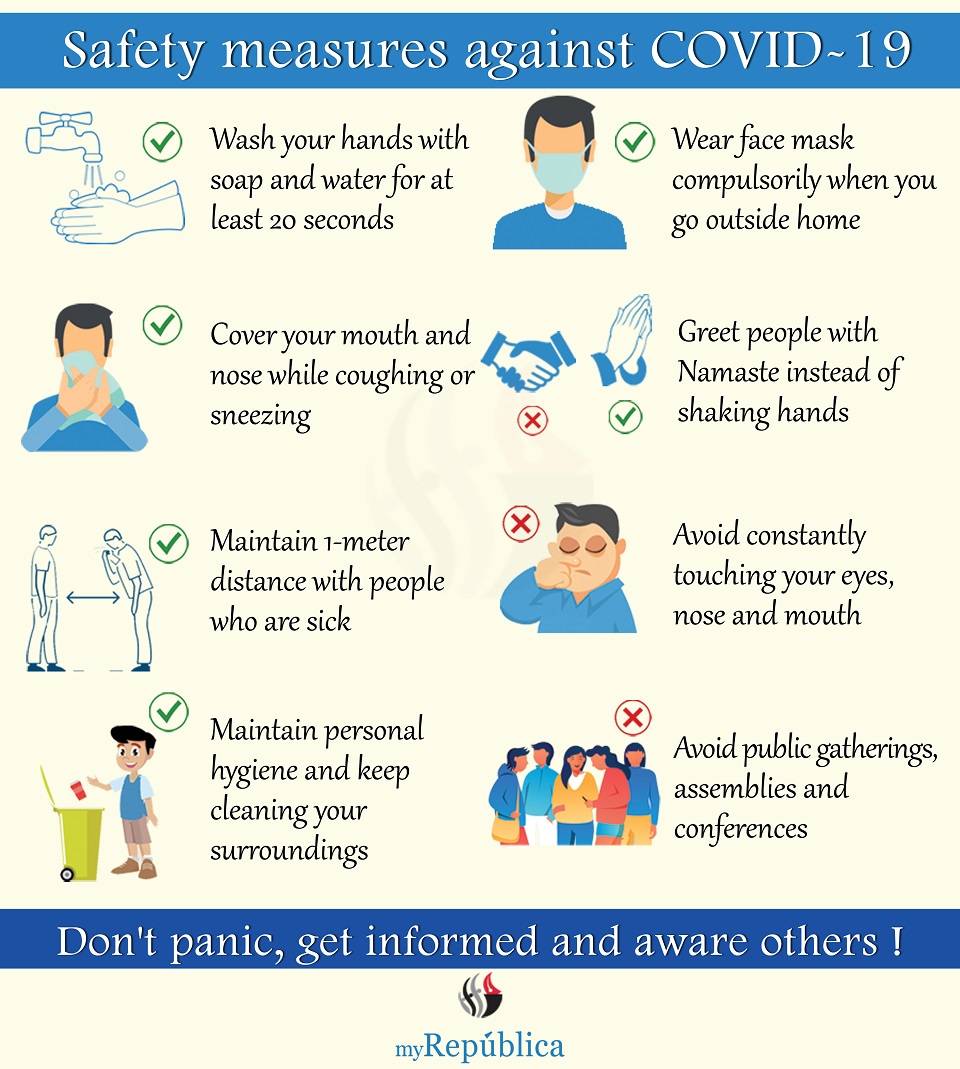
OR
Coronavirus: safety and readiness tips for you
Published On: March 17, 2020 10:30 PM NPT By: Republica | @RepublicaNepal

KATHMANDU, March 17: Amid coronavirus outbreak in many parts of the world, many international organizations including International Red Cross are highlighting some everyday health and preparedness steps that people around the globe can follow.
The Red Cross recommends following common sense steps to help prevent the spread of any respiratory virus:
Wash your hands often with soap and water for at least 20 seconds, especially after being in a public place, or after blowing your nose, coughing or sneezing. If soap and water are not readily available, use a hand sanitizer with at least 60% alcohol.
Avoid touching your eyes, nose or mouth with unwashed hands.
Avoid close contact with people who are sick.
Put distance between yourself and other people if COVID-19 is spreading in your community.
Stay home if you are sick, except to get medical care.
Cover your nose and mouth with a tissue when coughing or sneezing; throw used tissues in the trash. If a tissue isn’t available, cough or sneeze into your elbow or sleeve, not your hands.
Clean and disinfect frequently touched surfaces daily. This includes tables, doorknobs, light switches, handles, desks, computers, phones, keyboards, sinks, toilets and countertops.
If surfaces are dirty, clean them - use detergent or soap and water prior to disinfection.
Wear a facemask if you are sick. You should wear a facemask when you are around other people (e.g., sharing a room or vehicle) and before you enter a healthcare provider’s office.
Get your household ready
There are things you can do right now to be ready for any emergency, and many of these same tips will help you prepare as the coronavirus situation continues to evolve in South Asian countries.
Have a supply of food staples and household supplies like laundry detergent and bathroom items, and diapers if you have small children.
Check to make sure you have at least a 30-day supply of your prescription medications, and have other health supplies on hand, including pain relievers, stomach remedies, cough and cold medicines, fluids with electrolytes and vitamins.
Know how your local public health agency will share information in your community and stay informed. Find more information here.
Learn how your children’s school or daycare, and your workplace will handle a possible outbreak. Create a plan in the event of any closings, event cancellations or postponements.
If you care for older adults or children, plan and prepare for caring for them, should they or you become sick.
Help family members and neighbors get prepared and share the safety messaging with those who may not have access to it.
Who is at a high risk?
COVID-19 is a new disease, which means scientists and public health experts are still learning how it spreads, the severity of illness it causes and to what extent it may spread in the U.S.
Early information shows that some people are at higher risk of getting very sick from this virus. This includes older adults and people who have serious chronic medical conditions like heart disease, diabetes and lung disease.
If you are at higher risk for serious illness from COVID-19 because of your age or a serious medical condition, it is extra important for you to take actions to avoid getting sick.
Take everyday precautions to keep space between yourself and others.
When you go out in public, keep away from others who are sick, limit close contact and wash your hands often.
Avoid crowds as much as possible.
Stock up on supplies.
Contact your healthcare provider to ask about obtaining extra necessary medications to have on hand in case there is an outbreak of COVID-19 in your community and you need to stay home for a prolonged period of time.
If you cannot get extra medications, consider using a mail-order option.
Be sure you have over-the-counter medicines and medical supplies (tissues, etc.) to treat fever and other symptoms. Most people will be able to recover from COVID-19 at home.
Have enough household items and groceries on hand so that you will be prepared to stay at home for a period of time.
You May Like This

National Assembly put off until further notice
KATHMANDU, March 20: The National Assembly has been suspended until further notice. ... Read More...

Coronavirus deaths rise to more than 3,300 worldwide
BEIJING, March 6: More than 98,000 people have been infected by the coronavirus globally and over 3,300 people have died,... Read More...

Domestic airlines industry hit by coronavirus fear
KATHMANDU, March 6: Domestic airlines business has been hit hard by the fear of coronavirus, said the Airlines Operators Association... Read More...






Just In
- Challenges Confronting the New Coalition
- NRB introduces cautiously flexible measures to address ongoing slowdown in various economic sectors
- Forced Covid-19 cremations: is it too late for redemption?
- NRB to provide collateral-free loans to foreign employment seekers
- NEB to publish Grade 12 results next week
- Body handover begins; Relatives remain dissatisfied with insurance, compensation amount
- NC defers its plan to join Koshi govt
- NRB to review microfinance loan interest rate











Leave A Comment